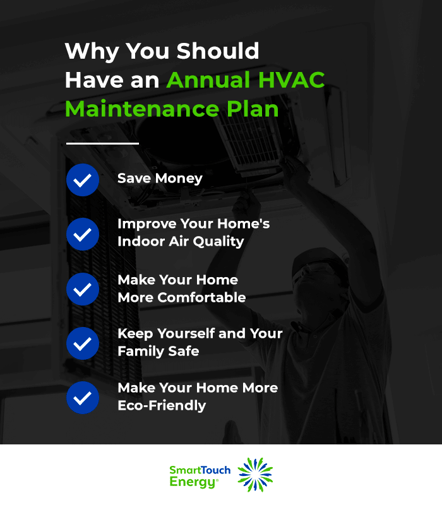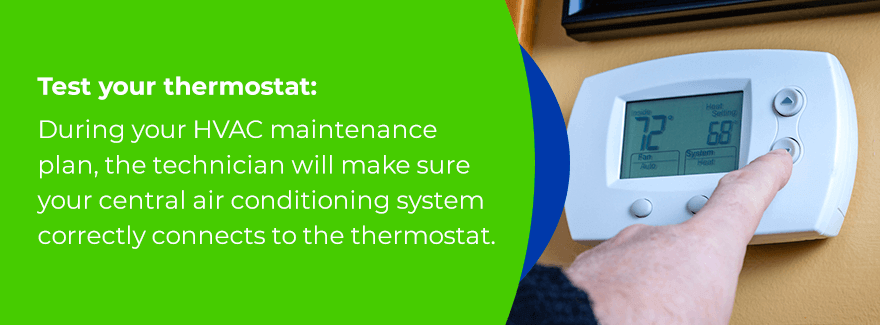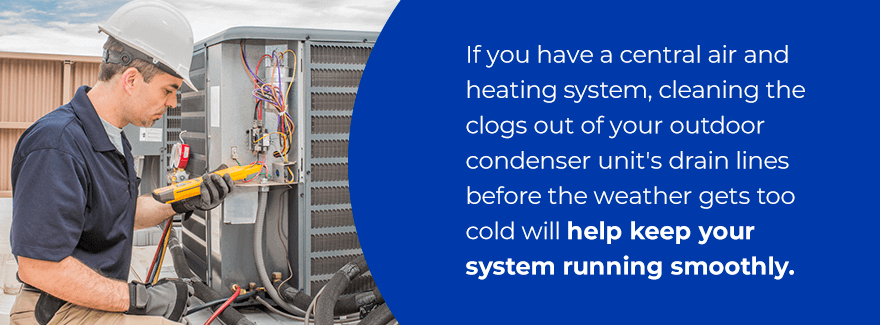Your home's heating, ventilation and air conditioning (HVAC) system needs regular maintenance all year long. When you keep up with your air conditioner and furnace, you can save money on your utility costs and have a more reliable unit. This guide will explain the importance of annual HVAC maintenance and help you develop a plan for how to take care of your heating and cooling appliances each season.
Why You Should Have an Annual HVAC Maintenance Plan
HVAC preventative maintenance saves you time, energy and money on your heating and air conditioning unit's lifespan. Here are some of the ways that an HVAC care routine adds value to your investment:
1. Save Money
By taking care of your HVAC system each year, you'll save money on:
- Energy costs: Heating and cooling make up about 50% of your home's monthly energy expenditure. A poorly maintained HVAC system uses more energy to regulate your home's temperature, so clearing debris and repairing the damage will save you energy and money.
- Potential costly repairs: When a specialist checks your unit, they'll repair broken components that could cause a system failure. You should get an inspection of your heating and cooling system to make sure it won't break down on you when you need it most.
- The unit itself: Excessive wear and tear on your HVAC unit could cut its lifespan short. When you invest in regular maintenance, your system could work for a couple decades.
- Your warranty: If you bought a brand-new HVAC system, it might have come with a contract that allows you to get free parts if they break. Most warranties require proof that you've been getting the system checked by a professional, so you need to schedule a maintenance appointment to maintain your agreement.
2. Improve Your Home's Indoor Air Quality
The environment in your home can be two to five times more polluted than outdoor air. An HVAC unit has a filtration system that keeps dust, debris and other allergens that cause allergies, asthma and other  respiratory conditions from circulating throughout your home. You need to replace and clean the filter each month, so it can continue cleaning the air. During a preventative HVAC maintenance appointment, a technician will clean and inspect your air ducts and replace your filter so that the air in your house can be better to breathe.
respiratory conditions from circulating throughout your home. You need to replace and clean the filter each month, so it can continue cleaning the air. During a preventative HVAC maintenance appointment, a technician will clean and inspect your air ducts and replace your filter so that the air in your house can be better to breathe.
3. Make Your Home More Comfortable
Your HVAC system's primary purpose is regulating the indoor temperature and humidity. When you maintain your heating and cooling appliances, they can work much more efficiently. You'll have a comfortable environment instead of shivering in the winter and sweating in the summer. Having a professional clean your ductwork and replace broken parts can also help sure you don't have unpleasant noises or smells coming from your machine.
4. Keep Yourself and Your Family Safe
An annual routine maintenance plan provides a reliable HVAC system you can count on in the coldest and warmest weather. By taking care of your heating and cooling appliances, you can also protect your loved ones from carbon monoxide poisoning. Inhaling even a low level of this odorless, invisible gas from a leak in your furnace can result in nausea, dizziness and unconsciousness. Hire a professional to service your oil furnace so that you don't have a potential hazard.
5. Make Your Home More Eco-Friendly
If you are looking to reduce your environmental impact, you might want to consider an energy-efficient HVAC system that uses less fuel. Programmable thermostats can also help to reduce your energy consumption since you can set specific temperatures and forget about it. For instance, you can set your thermometer to a higher setting for air conditioning if you're not at home and a lower temperature for heat to conserve energy.
Spring/Summer HVAC Maintenance Checklist
An annual HVAC maintenance plan includes taking care of your air conditioner in the spring or summer to get it ready for the year's hottest months. When the technician arrives at your house, they'll take care of your cooling system in the following ways:
- Inspect, clean and replace the filters: If you have a dirty filter, your equipment must work harder to regulate your home's temperature. Changing the filters about once a month makes your air conditioner more energy efficient and keeps the air in your living space clean.
- Wipe down the coils in the evaporator and condenser: A technician will inspect the components behind the blower and get rid of dust and debris with a soft brush and the appropriate cleaner.
- Clean drain lines and clear clogs: Preventing mold and algae accumulation from your unit is vital to providing a clean place for air to travel.
- Remove standing water from drain pans: Clogged drain lines could leave standing water in your air conditioner drain pans and cause a small flood on your property. A specialist could get rid of moisture accumulation with a wet/dry vacuum.
- Clean air ducts: Scrubbing the registers on your floor and vents on your ceiling with soapy, warm water can help to prevent debris, such as dust and pet hair, from getting into your air vents.
- Inspect the refrigerant lines for leaks: The refrigerant in your HVAC unit is the liquid that transfers the heat out of the indoor air and pushes it outside. During your maintenance appointment, a professional will check these lines for tears and cracks.
- Test your thermostat: During your HVAC maintenance plan, the technician will make sure your central air conditioning system correctly connects to the thermostat.

- Change batteries in your thermostat and remote: If your thermostat runs on batteries, you should replace them every six months. Consider also upgrading to a programmable thermostat that connects to your home's electrical system.
- Check your unit's electric connectivity: The technician will turn on your air conditioning system to ensure it works properly. While checking the electrical connections, they'll also tighten any wires that have become loose.
- Turn the unit on and makes sure it works: When the specialist turns on your AC unit, they'll check for unpleasant noises and odors that could signal a problem with one of the parts. You may also need a component replaced if the air conditioner doesn't turn on at all.
- Inspect your fan blades' and blowers airflow: A professional technician will inspect your fan blades for wear and tear and replace them if they're not working correctly.
- Lubricate moving parts and the motor's bearings: Dirt and debris can affect how your HVAC system works, so a technician needs to clean the blower fans and coils to prevent issues with your air conditioner in the future. Parts without the proper lubrication can cause friction in motors and increase its energy usage.
- Inspect the outdoor condenser unit cabinet: This component outside your house has various complex parts that could become damaged if they get wet. A specialist will check the condenser unit for leaks and ensure the cabinet door securely closes so that no debris or pests can get inside.
- Clear away the debris around the outdoor condenser unit: Leaves, sticks and pollen can collect around your outdoor condenser unit, especially if you have trees nearby. Even animals could make nests inside the unit. When the weather is pleasant outside, and the snow has melted, check your condenser unit for debris and clean it as necessary.
- Turn off your oil burner's humidifier: In the winter, it helps to have a humidifier on your oil burner to combat the dry heat coming out of it. When the weather gets warm and humid, you can turn off the water supply to save energy.
Fall/Winter HVAC Maintenance Checklist
When you hire a professional to check on your oil burner in the winter, they'll get your oil burner ready for the frigid months. Here are some of the ways they'll make sure your heating system is energy efficient and reliable:
- Replace the oil and air filters: Cleaning or replacing the air filters in your oil burner about one to three months keeps dust and debris out of your system. It helps to get the oil filter replaced about once a year to remove grit and dirt from your oil tank.
- Examine ductwork and vents: After switching out or cleaning your furnace's air filters, the technician will also inspect and clean the air ducts. These components that blow air into your home can fill up with pet hair, dust, dander and toys or food residue that may have fallen inside of them. Vacuuming your ductwork can eliminate the dust particles so that they don't travel into your home's central air system.
- Clean the oil burner: Besides cleaning the filter and the ductwork, the specialist will also clean the interior oil burner and the surrounding area. If you have any items within a few feet of the oil burner, it could be a fire hazard. After getting rid of clutter, they'll open the oil burner access panel and vacuum up pet hair, dust and dander inside it.
- Check pulleys and belts: While the technician is cleaning the oil burner access panel, they'll check the blower belt because it tends to break or wear out over time. If the belt is frayed or dried, they'll replace it to ensure smooth operation.
- Inspect the ignition burner assembly: To check your ignition assembly, the technician will turn on the furnace and study the ignition sequence. During the appointment, they'll check the ignitor for damage, corrosion and cracks. They'll also make sure the ignition source is away from anything flammable to prevent an unwanted fire.
- Examine the heat exchanger or heating elements: A specialist will inspect the airflow over the heat exchanger to avoid overheating.
- Study the flue system and ensure secure attachment: During the HVAC maintenance check-up, the technician will look at the flue, which sends your oil burner's combustion products out of your home for holes, cracks and leaks. Even though you can put a piece of tape over minor cracks, it would be best to replace the pipes to prevent unwanted leaks.
- Check gas pressure: To check your furnace's gas pressure, the specialist will need to turn off your furnace and access the service panel on the unit's side. They'll know how to remove the wires to put them back correctly after the inspection. After holding a multimeter against one of the gas valve terminals to determine its level, the technician can recommend whether you need to replace your gas valve.
- Clear drain lines and pans: If you have a central air and heating system, cleaning the clogs out of your outdoor condenser unit's drain lines before the weather gets too cold will help keep your system running smoothly.
- Inspect the electrical connections: If you have a central HVAC unit, a specialist will check the heat pump inside your evaporator unit to ensure all the components are functioning correctly.
- Lubricate motors, bearings and other moving parts: The technician has the technology and expertise to tighten and lubricate all moving parts to prevent friction and wear.
- Check thermostats and controls: After changing your thermostat's batteries, you can adjust it and see how the oil burner responds to the set temperature. While the oil burner is on, the technician can detect noises and smells coming out of it, and they can make sure the blowers are expelling hot air.
- Inspect the heat pump: If you have a central HVAC unit, a specialist will check the heat pump inside your evaporator unit to make sure all the components are functioning properly.
- Inspect the fuel line: This component transfers fuel to the burner to heat your home. A technician can assess the fuel line's assembly and look for rust and leaks, replacing any faulty parts.
- Check your home's carbon monoxide detector: If you have an oil burner, you should install a carbon monoxide detector to prevent this odorless, colorless gas from leaking out of the heating unit into your home's atmosphere. A working carbon monoxide detector will alert you of the first sign of this gas in your house to keep you and your family safe.
- Clean up the outdoor condenser unit: Before the temperature gets too cold outside, be sure to get rid of the debris around your outdoor condenser unit to make sure it doesn't affect your central heating system's operation.

- Consider adding insulation: A thermal barrier on your walls and ceilings could enhance your home's energy efficiency by keeping the heat from your oil burner inside the house. Your insulation should last at least a couple of decades, but if you haven't updated it in a while and you've had drafts throughout the house, consider getting it replaced.
- Get your oil tank filled: Before running your oil burner at the beginning of the year, call in a professional to fill your oil tank with a high-quality heating source.
Let Smart Touch Energy Help You Maintain Your HVAC System
An energy efficiency professional can help you take care of your heating, ventilation and air conditioning units. Setting up an annual HVAC maintenance plan will allow you to keep track of your investment without worrying about all the details. Let an expert inspect your system and replace all the broken parts so that your system will last for many years in your home.
At Smart Touch Energy, we specialize in air conditioning tune-up services to get your living space ready for the summer heat, including replacing your air filters and repairing any damaged components. In the winter, you could also benefit from our oil burner cleaning services, where we clean your furnace so that it's as energy efficient as possible. Type in your zip code to get local help and schedule an appointment today.




